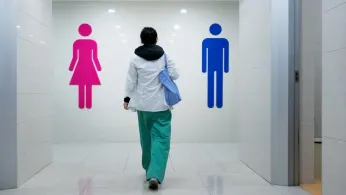
5 hours ago
USC and University of Arizona Reject Trump Administration’s Transgender Bathroom Ban Demands
READ TIME: 4 MIN.
The University of Southern California (USC) and the University of Arizona (UA) have publicly rejected demands from the Trump administration to implement bans on transgender individuals using bathrooms consistent with their gender identity. These demands were part of a broader “compact” sent to nine universities, offering preferential access to federal grants in exchange for policy changes, including restrictions targeting transgender students, limiting diversity initiatives, and curbing student protests.
Both universities issued responses declining to implement these measures, joining at least five other institutions that have refused similar requests. The administration’s compact called for a complete rejection of transgender students’ gender identities, bans on their use of campus bathrooms, and exclusion from sports, prompting immediate backlash from campus communities.
At USC, opposition was swift and vocal. Over 500 attendees signed up to speak at an October 6 meeting, with every speaker voicing opposition to the administration’s compact. Faculty leaders denounced the proposal as an attack on academic freedom and diversity. Edward Saxon, professor of cinematic arts, warned, “History will not judge USC kindly if it agrees to this compact. The government is clearly engaged in a war on education…. Capitulation is the fastest route to ruin.” Amelia Jones, vice dean of faculty and research at the School of Art and Design, added, “There can be no negotiation. They are playing by the fascist playbook.”
USC’s interim president Beong-Soo Kim emphasized the university’s commitment to institutional neutrality and the importance of civil discourse, stating, “Academic excellence cannot exist without a vibrant marketplace of ideas where all different views can be explored, debated, and challenged…. Without an environment where students and faculty can freely debate a broad range of ideas and viewpoints, we could not produce outstanding research, teach our students to think critically, or instill the civic values needed for our democracy to flourish”.
At the University of Arizona, the administration’s proposal triggered protests from students and faculty. Eighteen student organizations, including the Black Student Association, the Pride Alliance, and College Democrats, led demonstrations condemning the compact. In faculty meetings, professors described the compact as discriminatory and politically motivated. Dr. Carol Brochin of the College of Education told the assembly, “For those of you who are trans on this campus, we stand by you…. What I’m worried about as we sit here and determine whether our university is going to sign this compact is that it’s already being leveraged by this administration.” Senator Zeiders of the School of Family and Consumer Sciences criticized the compact for shifting the university’s focus from scholarship to political compliance.
The UA Faculty Senate overwhelmingly rejected the compact, with a vote of 40 to 8 against acceptance. However, some reports suggest that the university’s official correspondence to federal authorities was diplomatically worded, referencing a willingness to collaborate on surveys and highlighting existing non-discrimination policies protecting sexual orientation and gender identity, but not explicitly mentioning bathrooms. The letter reportedly stated, “the university has not agreed to the terms outlined in the draft proposal,” which outlets have interpreted as a rejection, though negotiations may be ongoing.
The Trump administration’s compact represents an escalation of federal efforts to restrict the rights of transgender people in public institutions. Similar bans have been proposed or enacted in several states, with a patchwork of policies resulting in inconsistent protections nationwide. The universities’ refusals signal resistance to federal intervention in campus affairs and a commitment to maintaining inclusive environments for all students.
Other universities, including Brown, Columbia, Harvard, and Penn, have faced similar demands. While some initially complied with anti-LGBTQ+ measures, several have since rejected the latest compact. The widespread backlash underscores the importance of institutional autonomy and the role of campus communities in shaping policy.
The immediate effect of these rejections is the continued protection of transgender students’ rights to access campus facilities in accordance with their gender identity. Both USC and UA maintain non-discrimination policies that explicitly include gender identity and sexual orientation as protected categories. Advocacy groups have praised the universities for standing up to federal pressure and reaffirming their commitment to diversity, equity, and inclusion.
Transgender students and campus advocacy organizations have played a central role in opposing the proposed bans. The Pride Alliance at UA and LGBTQ+ groups at USC mobilized quickly to organize rallies, speak at public meetings, and collaborate with faculty allies. Many expressed relief that their universities chose not to comply, but also caution that ongoing vigilance is needed as federal policies and enforcement priorities may continue to shift.
“While it’s encouraging that our school has refused these demands, we know that the fight isn’t over,” said a representative of UA’s Pride Alliance during a campus demonstration. “Transgender people deserve safety, dignity, and respect—not just in bathrooms, but across all aspects of campus life.”
Faculty and student leaders have emphasized the broader significance of these decisions. “This isn’t just about bathrooms,” said Dr. Brochin. “It’s about whether our university will stand up for all its students, or bow to political pressure at the expense of our values.” The ongoing resistance is part of a larger movement for LGBTQ+ rights in education, reflecting increased awareness and mobilization in response to anti-transgender legislation nationwide.
As other universities continue to weigh their responses to federal pressure, the actions taken by USC and UA set a precedent for institutional autonomy and inclusive policy. Community leaders urge vigilance and continued advocacy, warning that federal and state efforts to restrict transgender rights may persist.
In the meantime, both universities have assured students that their existing protections will remain in place. The Office of Institutional Equity at UA reiterates the importance of safe restroom access for all students, noting that transgender individuals may face harassment or violence when denied facilities consistent with their gender identity.
For many in the LGBTQ+ community, the stand taken by USC and UA is a reminder of the power of collective action, the importance of institutional commitment to equity, and the need for ongoing vigilance in defense of civil rights.






